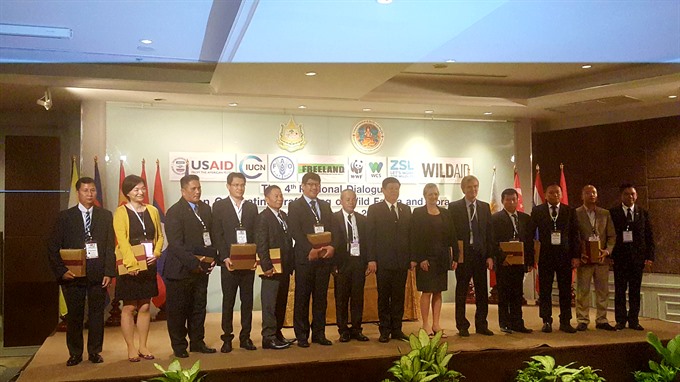More efforts are needed to strengthen and support collaboration among ASEAN countries and China to combat the increasing wildlife smuggling and poaching of endangered wildlife, the 4th Regional Dialogue on Combating Trafficking of Wild Fauna and Flora heard in Bangkok on Wednesday.

The 4th Regional Dialogue on Combating Trafficking of Wild Fauna and Flora started in Bangkok on September 13. — VNS Photo Hoàng Nam
Thailand’s Minister of Natural Resources and Environment General Surasak Kanjanarat said: “Despite a domestic decline in illegal cases, the illegal international trades still exist. No matter how much we can do by ourselves at the national level, it is never enough. Only through the spirit of collaboration among ASEAN member states, China and concerned partners in an action-oriented effort can this problem be effectively addressed throughout the entire supply chain.”
Thanya Netithammakun, director general of the Thai Department of National Parks, Wildlife and Plant Conservation, said in his opening speech: “[The dialogue] focuses on exchange of information, including best practices and challenges to strengthen regional collaboration in the context of illegal trafficking of CITES-listed species of wild fauna and flora and their products, especially tiger, pangolin, ivory and rhino horn.”
The two-day event will see country updates, presentations, and group and panel discussions by 40 delegates from ASEAN countries and China and some 80 representatives from various local and international agencies.
Recently Việt Nam has emerged as a destination for many illegal wildlife products.
David Lawson, USAID Saving Species Project’s Chief of Party told Việt Nam News: “It’s probably related to the fact that Việt Nam is becoming a wealthier country, so now people can afford things they can’t before. And one of the things culturally people want to get are things like rhino horns and ivory, and because of the limited population of rhinos and elephants, that’s where the problem is.
“Việt Nam in July has approved a penal code, and that is a really good illustration because the penalty for illegally possessing rhino horn and ivory now is much greater.
“That penal code will come into action in early 2018. But part of that process then is to assist in producing the guidelines and things for prosecutors and judges to do training programmes for police and customs.
“I think that the dialogues are important to raise awareness at a high level. I mean you got some senior people here in all 10 countries, and these sorts of dialogues do help keep the picture alive."
Vương Tiến Mạnh, deputy director of the Ministry of Agriculture and Rural Development’s CITES (the Convention on International Trade in Endangered Species of Wild Fauna and Flora) Management Authority and head of the Vietnamese delegation, said: “Việt Nam greatly welcomes the dialogue because efforts from one nation cannot stop the cross-border crime. We came to the dialogue, learnt and shared our experience in making and enforcing laws, increasing awareness and reducing demand for wildlife products.”
Phạm Tiến Trinh, a customs official, said: “The most important thing is that through dialogue Việt Nam can set up a network to exchange information with other nations to deal with illegal wildlife trafficking in the fastest and most effective way.” — VNS